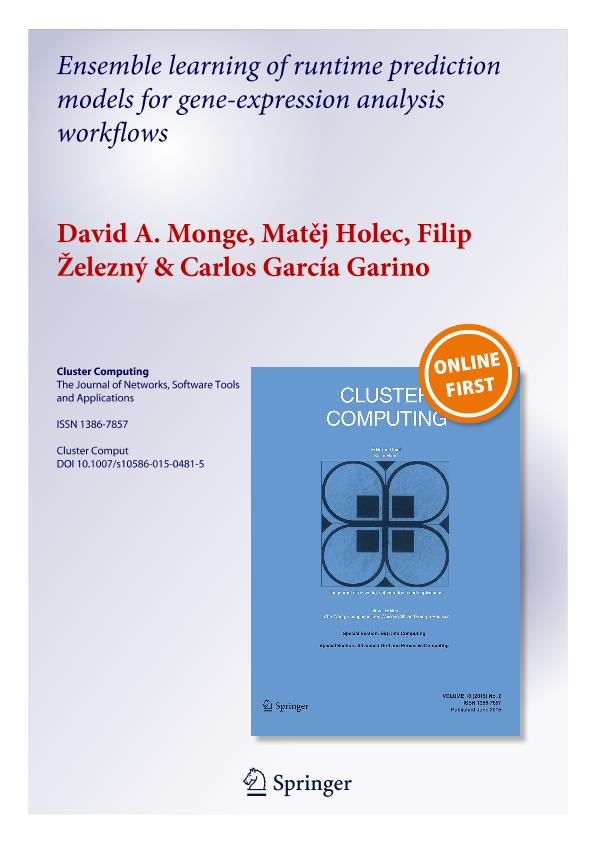Mostrar el registro sencillo del ítem
dc.contributor.author
Monge Bosdari, David Antonio

dc.contributor.author
Holec, Matej
dc.contributor.author
Zelezný, Filip
dc.contributor.author
Garcia Garino, Carlos Gabriel

dc.date.available
2020-03-19T18:51:38Z
dc.date.issued
2015-12
dc.identifier.citation
Monge Bosdari, David Antonio; Holec, Matej; Zelezný, Filip; Garcia Garino, Carlos Gabriel; Ensemble learning of runtime prediction models for gene-expression analysis workflows; Springer; Cluster Computing-the Journal Of Networks Software Tools And Applications; 18; 4; 12-2015; 1317-1329
dc.identifier.issn
1386-7857
dc.identifier.uri
http://hdl.handle.net/11336/100324
dc.description.abstract
The adequate management of scientific workflow applications strongly depends on the availability of accurate performance models of sub-tasks. Numerous approaches use machine learning to generate such models autonomously, thus alleviating the human effort associated to this process. However, these standalone models may lack robustness, leading to a decay on the quality of information provided to workflow systems on top. This paper presents a novel approach for learning ensemble prediction models of tasks runtime. The ensemble-learning method entitled bootstrap aggregating (bagging) is used to produce robust ensembles of M5P regression trees of better predictive performance than could be achieved by standalone models. Our approach has been tested on gene expression analysis workflows. The results show that the ensemble method leads to significant prediction-error reductions when compared with learned standalone models. This is the first initiative using ensemble learning for generating performance prediction models. These promising results encourage further research in this direction.
dc.format
application/pdf
dc.language.iso
eng
dc.publisher
Springer

dc.rights
info:eu-repo/semantics/openAccess
dc.rights.uri
https://creativecommons.org/licenses/by-nc-sa/2.5/ar/
dc.subject
DATA-INTENSIVE WORKFLOWS
dc.subject
ENSEMBLE LEARNING
dc.subject
GENE EXPRESSIONS ANALYSIS EXPERIMENTS
dc.subject
PERFORMANCE PREDICTION
dc.subject.classification
Ciencias de la Computación

dc.subject.classification
Ciencias de la Computación e Información

dc.subject.classification
CIENCIAS NATURALES Y EXACTAS

dc.title
Ensemble learning of runtime prediction models for gene-expression analysis workflows
dc.type
info:eu-repo/semantics/article
dc.type
info:ar-repo/semantics/artículo
dc.type
info:eu-repo/semantics/publishedVersion
dc.date.updated
2020-03-18T20:34:23Z
dc.journal.volume
18
dc.journal.number
4
dc.journal.pagination
1317-1329
dc.journal.pais
Alemania

dc.description.fil
Fil: Monge Bosdari, David Antonio. Universidad Nacional de Cuyo. Instituto para las Tecnologías de la Informacion y las Comunicaciones; Argentina. Consejo Nacional de Investigaciones Científicas y Técnicas. Centro Científico Tecnológico Conicet - Mendoza; Argentina
dc.description.fil
Fil: Holec, Matej. Czech Technical University; República Checa
dc.description.fil
Fil: Zelezný, Filip. Czech Technical University; República Checa
dc.description.fil
Fil: Garcia Garino, Carlos Gabriel. Consejo Nacional de Investigaciones Científicas y Técnicas. Centro Científico Tecnológico Conicet - Mendoza; Argentina. Universidad Nacional de Cuyo. Instituto Tecnológico Universitario; Argentina
dc.journal.title
Cluster Computing-the Journal Of Networks Software Tools And Applications

dc.relation.alternativeid
info:eu-repo/semantics/altIdentifier/doi/http://dx.doi.org/10.1007/s10586-015-0481-5
dc.relation.alternativeid
info:eu-repo/semantics/altIdentifier/url/https://link.springer.com/article/10.1007/s10586-015-0481-5
Archivos asociados
